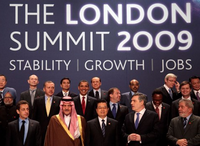The 2012 London Olympics may still be several years away, but yesterday, the city played host to a different type of games altogether -- the G-20 summit on the global economic crisis. This time, the competitors were not the world's premier athletes but rather political leaders representing the world's most powerful economies. By the end of the conference, though, no single country emerged atop the podium. Instead, the clearest winner appears to be the International Monetary Fund (IMF), which received another boost in its quest to reassert itself as the protector of global economic stability. Still, if the world's rising economic powers did not leave with any immediate tangible gains, they did book a substantial I.O.U. in return for their cooperation. In the weeks leading up to the meeting, three distinct blocs emerged, each with their own priorities for April 2: The United States and Britain favored another round of coordinated stimulus packages; France and Germany positioned themselves to oppose any increase in spending, focusing instead on a radical reformation of capitalism through enhanced regulation; China and Russia, meanwhile, shifted the focus from financial to monetary issues, calling for the creation of a new global currency that would ultimately replace the dollar as the world's reserve currency.
G-20 Economic Summit: Faster, Higher, Stronger?

